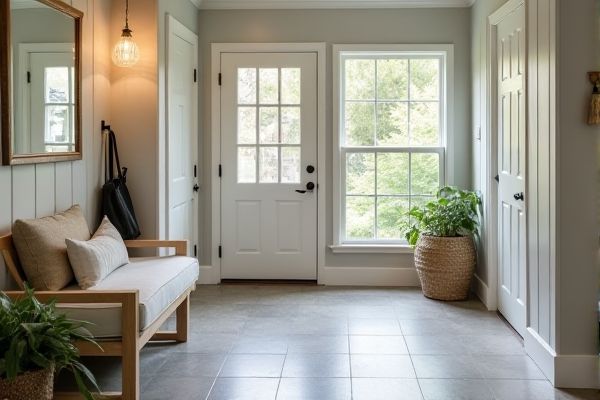
Vinyl flooring offers water resistance and softness underfoot, making it a practical choice for your mudroom where moisture and heavy foot traffic are common. Ceramic tile is highly durable and easy to clean but can feel cold and hard; explore the rest of this article to help decide which option best suits your space.
Table of Comparison
| Feature | Vinyl Flooring | Ceramic Tile |
|---|---|---|
| Durability | Moderate; resistant to scratches, dents, and water | High; highly resistant to wear, scratches, and water |
| Water Resistance | Excellent; waterproof options available | Excellent; naturally waterproof and moisture-resistant |
| Maintenance | Low; easy to clean with sweeping and mopping | Moderate; requires grout cleaning and occasional sealing |
| Installation | Easy; DIY-friendly with click-lock or glue-down options | Complex; professional installation recommended |
| Comfort | Softer and warmer underfoot | Harder and colder surface |
| Cost | Lower; affordable material and installation costs | Higher; costly materials and installation fees |
| Appearance | Variety of styles, mimics wood or stone | Classic, elegant look with numerous design options |
| Best Use in Mudroom | Ideal for budget-friendly, water-resistant flooring | Best for long-lasting, heavy-traffic, moisture-prone areas |
Introduction to Mudroom Flooring Choices
Vinyl flooring in mudrooms offers water resistance, durability, and ease of maintenance, making it ideal for high-traffic, moisture-prone areas. Ceramic tile provides exceptional hardness and stain resistance but can be colder and harder underfoot, requiring mats or rugs for comfort. Both options come in various styles and finishes, allowing customization to match mudroom aesthetics while addressing functional needs.
Overview: Vinyl Flooring vs Ceramic Tile
Vinyl flooring offers a waterproof, cushioned surface that is easy to install and maintain, making it ideal for mudrooms with high foot traffic and moisture exposure. Ceramic tile provides superior durability and resistance to scratches and stains, with a harder surface that can withstand heavy wear and is highly suitable for mudrooms prone to mud and dirt. Choosing between vinyl and ceramic tile depends on balancing comfort, maintenance, and long-term durability requirements specific to mudroom environments.
Durability Comparison in High-Traffic Mudrooms
Vinyl flooring offers excellent durability with resistance to scratches, dents, and water, making it ideal for high-traffic mudrooms subject to frequent moisture and dirt. Ceramic tile provides superior hardness and long-lasting wear but can crack under heavy impact or shifting subfloors. Both options withstand heavy foot traffic effectively, yet vinyl's flexibility and water resistance give it an edge in environments prone to dropped items and constant wet conditions.
Water and Stain Resistance Analysis
Vinyl flooring offers superior water resistance due to its non-porous surface, making it highly effective in preventing water penetration and stains in mudrooms. Ceramic tile, while also water-resistant, relies heavily on grout quality and sealing to prevent water seepage and staining over time. For areas prone to frequent moisture exposure, vinyl's resilience to standing water and ease of cleaning provides a more durable solution compared to ceramic tile.
Installation Process: Vinyl vs Ceramic Tile
Vinyl flooring offers a straightforward installation process, often featuring click-lock or peel-and-stick options that can be completed quickly without specialized tools, making it ideal for DIY projects in your mudroom. Ceramic tile installation requires more preparation, including subfloor leveling, mortar application, tile placement, and grout curing, typically demanding professional skills and a longer time frame. For a mudroom where moisture resistance and durability are essential, weighing your comfort with installation complexity against long-term maintenance needs is crucial.
Maintenance Requirements for Mudroom Floors
Vinyl flooring in mudrooms offers low maintenance with simple cleaning routines involving sweeping and occasional mopping, while ceramic tile requires regular grout sealing to prevent stains and moisture damage. Ceramic tile is more durable against heavy moisture but can be prone to cracking if heavy objects are dropped, necessitating occasional repairs. Your choice depends on balancing the ease of upkeep with the durability needs of a high-traffic, potentially wet mudroom area.
Cost Comparison: Vinyl vs Ceramic
Vinyl flooring costs typically range from $2 to $7 per square foot, making it a budget-friendly option for mudrooms compared to ceramic tile, which averages between $5 to $15 per square foot. Installation expenses also differ, with vinyl requiring less labor and time, thus reducing overall costs. Vinyl's affordability combined with easier installation makes it a cost-effective choice for mudroom renovations.
Style and Design Options for Mudrooms
Vinyl flooring offers a wide array of style and design options perfect for mudrooms, including realistic wood grains and stone patterns that mimic ceramic tile's classic appeal without the cold, hard feel. Ceramic tile provides endless color, shape, and texture choices, from intricate mosaics to large-format tiles, offering durability and a timeless aesthetic in high-traffic areas. Your mudroom can benefit from vinyl's softer, warmer surface and ease of installation, while ceramic tile delivers unmatched longevity and a variety of custom design possibilities.
Comfort and Safety Underfoot
Vinyl flooring offers superior comfort and warmth underfoot in a mudroom compared to ceramic tile, which tends to feel cold and hard. The cushioned surface of vinyl reduces fatigue and minimizes the risk of slips, enhancing safety especially in wet or muddy conditions. Choosing vinyl flooring can improve your mudroom's comfort and safety without sacrificing durability or style.
Final Recommendation: Best Flooring for Mudrooms
Vinyl flooring offers superior water resistance, durability, and comfort underfoot, making it the best choice for high-traffic mudrooms prone to moisture and dirt. Ceramic tile excels in hardness and aesthetic versatility but can be cold and slippery without radiant heating or textured surfaces. For mudrooms, vinyl's practicality and resilience provide optimal long-term performance and maintenance ease.
 homyna.com
homyna.com